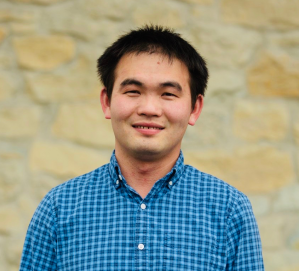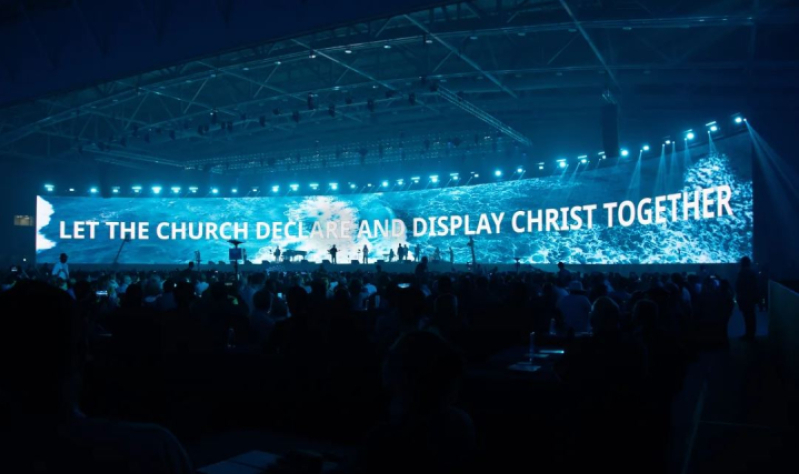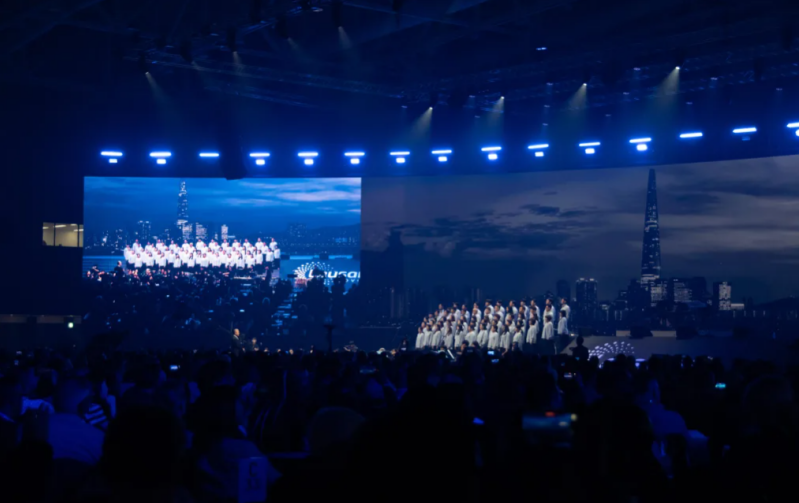
This past September 22-28, I had the privilege of attending the Fourth Lausanne Congress in Incheon, South Korea, as a young leader of the new generation. I was also privileged to be able to serve in Chinese text translation, registration, coordination, and other aspects. Therefore, I had the opportunity to witness the behind-the-scenes preparations and operations of the Congress and learned many valuable lessons. The theme this year was “Let the Church Declare and Display Christ Together”.
I was in charge of registration two days before the official opening of the Congress. I worked alongside a South Korean brother who held up the sign to guide people to where they needed to be. He held the sign for two whole days, and since he was not tall in stature, it was quite a challenging task. Later we had the chance to sit down and talk, and I came to know that he is actually a professor from Seoul University. He could only get a two-day vacation, so that’s how long he could stay at Lausanne, he needed to return to work on the third day. And yet, he is just one of the 1,400 volunteers sent from the Korean Church. The volunteers are not bored, jobless people, not to mention the 6,000 brothers and sisters from the local church who were praying 24/7 for the Congress. How can you not be moved by this heart of serving?
Every day, more than 5,000 disciples of Christ, God’s people from over 200 countries globally, gathered and worshiped. Looking at such a scene, I felt overwhelming peace, joy, and hope like no other. This must be a glimpse of what it would be like when we all worship in heaven.

1. The Lausanne Movement and this year’s Congress are not perfect, there are many aspects that were lacking and insufficient. For example, theological diversity (which of course, depends on your personal theological spectrum), and also the fact that this year’s conference was more show than actual content. Nevertheless, I believe that all the believers were doing their best in the commission and responsibilities God had entrusted to them. We will never reach perfection. Even today, as I boarded the flight home, I remembered the various issues we wrote down in the morning meeting. Our committee coworkers wrote at the bottom of the list of Issues to Improve On, “We still love you.” This touched me deeply. Even though there are many imperfections, and many places to improve on, still, in Christ, we can embrace and love one another.
2. The core of the Lausanne Movement is to promote unity and cooperation among the Global Church in mission. This means that Lausanne by nature is not a denomination (which is united by theology and church government), or a mere conference, but a place where participants strategize and work together during and after the gatherings to carry each other’s burdens in their respective callings. I believe that this is very necessary, very noble, and is something worth the effort.
3. The Global Church needs to be more connected. We need to hear the work of God in every corner of the earth, and also the challenges they face. That is how we can truly support each other, carry the burdens, share resources, and open our horizons. We need to let go of the “King of the Mountain” mindset so deeply ingrained in us and stop only mowing our own lawns. This is necessary, helpful, and meaningful. The Congress allowed me to hear the stories and testimonies of God’s hand in regions around the world. Many times these stories are told with tears. Some were told by a foreigner in fluent Chinese. These stories were so real, so precious, that you can never forget them, and you want to hear it again after hearing it once. It reaches the depths of your soul. They are not stories you would find randomly on the internet, and you wouldn’t find them if you focused only on your life and your ministry.
4. Chinese churches should learn from Lausanne’s focus and emphasis on various fields. For example, Lausanne emphasizes workplace evangelism, young leaders, evangelism strategies in the digital age, the persecuted church and unreached people groups, etc. All of these fields are mostly considered foreign in the Chinese church, and we have yet to establish systematic and coherent mission ministries in them. However, Lausanne’s strong advocacy for them can point us in the direction our future mission should go in.
5. Reflecting on money. Holding the Fourth Lausanne Congress required immense manpower, money, and resources from the South Korean church. We as the Chinese Church have a lot to reflect on, repent, and learn from. In most Chinese churches, the first reaction to money is to be “faithful”, but the definition of “faithful” is to not spend money. Most people spend on themselves matter-of-factly, but see spending on the church, God’s Kingdom, and mission as “unfaithful wasting”. To some, having a travel budget in the thousands, getting a car in the ten-thousands, landing a mansion in the hundred-thousands even millions, are considered “necessary” and “faithful”. We need to reevaluate our attitudes in financial management, especially regarding our investment in the Kingdom of God.

6. Lausanne did not pay sufficient attention to the local church this time, which is something I regret. The theology of the Lausanne Movement is not really on the local church, but more towards mission organizations, instead of the role churches play in regional mission. Lausanne also tends to emphasize mission within professions, instead of raising full-time missionaries serving in churches. This doesn’t mean that Lausanne ignores local churches and full-time missionaries, but personally, I feel that Lausanne’s focus is not here. I find this somewhat regrettable. Of course, this may also be related to the limitations churches have in mission or a result of disappointment in the churches for their lack of initiative in local missions. However, I hope that Lausanne can come to put more focus on the role of local churches in mission and push for the concept of “church-centered mission” to be realized.
7. As a movement, the limitations of Lausanne are obvious. How do we realize the outcomes of the Congress? How do we provide actual platforms and opportunities to cooperate with the global church? How do we keep theological purity, and yet still unite the evangelical global church? Lausanne seems to have hit a bottleneck and temporary stagnation. But there are also new challenges and opportunities. Personally, I would not place overly high expectations for Lausanne. If we try to do a good job with the proposals and focuses of just this year’s conference, we will already have our work cut out for us. Instead of having unrealistic expectations or being critical, it might be better to focus on the present and just do our best.
8. The Chinese churches need to be more involved in global missions. In this year’s Congress, there were a good number of Chinese pastors, church leaders, and participants, but we still need to more deeply, more practically be involved in global mission. We cannot be self-absorbed, or self-isolated, but instead, we need to always study, update, and practice. We need to admit that we are not doing enough in our missions, whether that is our missionary dispatch organizations, evangelism organizations, or our local churches. In the grace and blessings God has given us, there are still many underused for the Kingdom of God. That is why we need to repent and seek breakthroughs and change.
9. The July 2026 conference should continue to explore practical actions and strategies for the global Chinese mission, this is my hope. The purpose of this gathering should be to listen, learn, and develop practical strategies, especially for the younger generation. The issue of aging congregations in the global Chinese Church is still prevalent. That is why I look forward to discussion about raising new young leaders, mission strategies targeting the younger generation, and how to shepherd and restore the youth who were lost in 2026. The development of these strategies and platforms for cooperation would not be possible without the support of the pastors, leaders, and Christians, as well as the missionaries from organizations, and participation in the Conference, offerings, and prayers.
10. As pastors in the global Chinese Church, what can we do? I’ve mentioned how Lausanne seems to be downplaying the role of the local church, so what can we as pastors do to promote mission? What areas can we reflect on? Are we still in the old model of “supporting mission through offering”? We need to study and grow, and maybe we have a lot of areas to improve in. As local church pastors, can we surpass the mindset of “my congregation is the most important”, and establish mission-oriented churches? Can we promote “mission-oriented discipleship training” in our churches?
11. Lastly, the fellowship. it was more than wonderful to be able to get coffee, enjoy meals, and talk through the night with old and new friends between breaks at Lausanne. Our conversations had light-hearted small talk and serious discussions about theology and church. We had tear-filled prayers and hearty laughs. These experiences and memories are spiritual treasures, precious moments that are hard to come by in my everyday ministering.
The above are my personal feelings about my participation in the Congress, and are provided to the public only as reference.

Author's Bio: Pastor Calvin Qin has four young children with his wife. He is a visiting pastor at the Faith Chinese North America Baptist Church (北美浸信会信友堂), ministering mainly to young families and teens in the church. He had previously planted the Chinese Community Church of Indianapolis Northwest and is currently studying at the Canadian Chinese School of Theology Vancouver, pursuing a D.Min..
Disclaimer: Original article was posted on Pastor Calvin Qin’s (秦路) personal blog, Defending the True Path in Courage (勇守真道) and is reposted with permission by the Gospel Herald. Edits for clarity and tone were made in the process of translating the original Chinese text into English.






